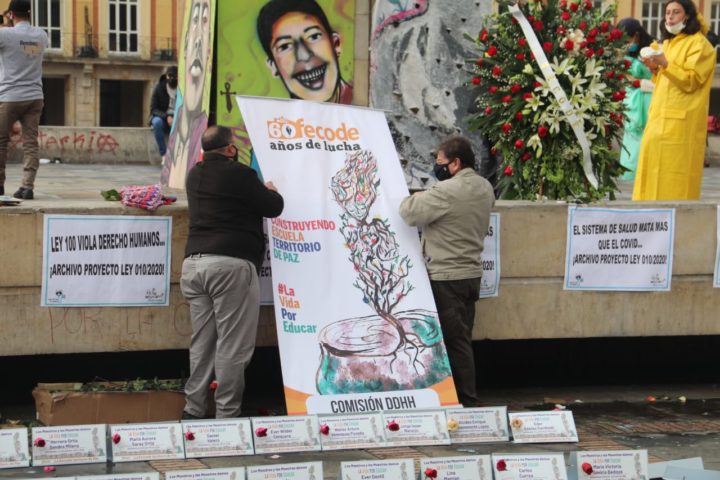Colombian history has been characterised by the existence of conflictive, difficult and dangerous conditions for social movements, trade unions, peasants, indigenous people and Afro-descendants, which extend to the possibility of consolidating critical thinking in general. Opposition political parties have been literally exterminated for exercising their right to propose alternative politicaloptions to those of the traditional groups in power. The political situation in Colombia during the current government has been characterized by an increase in threats and selective assassinations of social leaders, demobilized FARC members, human rights defenders, and opponents of the policies of the Democratic Center. There has been no direct and decisive intervention by the national government to find those responsible, capture them and condemn them. The situation of confinement experienced by the pandemic has substantially affected the possibilities of publicly expressing rejection of the situation of generalised violence that has escalated throughout the year.
In this scenario, the Colombian Federation of Education Workers (FECODE), its leadership and the more than 350,000 teachers that are part of it, have been repeatedly attacked by extreme right-wing actors and political parties that support the government. They have exacerbated a violent discourse that ends up justifying extreme actions against critical thinking, leading to teachers being murdered in different regions of the country.
In the case of Colombia, the struggle for the right to education overlaps with the struggle for the right to life. For this reason, the undersigned organisations expressour most radical rejection of these manifestations of violence, and ask the Colombian government to show conclusive results in the investigations, and the international community to exercise rigorous vigilance over the situation experienced by teachers inColombia, in particular the members of FECODE, to whom we express all our solidarity and support in these difficult circumstances.
What is being denounced today is not a purely conjunctural phenomenon but a political practice with regrettable cultural effects that have consolidated a naturalization of violence and physical extermination of opponents, as a means to prevent the achievement of the minimum democratic demands requested by the Colombian people who suffer the effects of inequality. The call is tostop once and for all the impunity that exists in relation to this type of acts.
No peace process can be built as long as the violence, persecution and murders that every day mourn the Colombian people -together with those of all Latin America and the Caribbean -are not stopped. We must raise our voices to demand protection for social references, especially for teachers, and justice for all the victims of the conflict.
Signed by:
Latin American Campaign for the Right to Education (CLADE); Latin American Network of Teacher Work Studies (RED ESTRADO); Global Campaign for Education (GCE); CLACSO Working Group on Educational Policies and the Right to Education; Internacional de la Educación América Latina (IEAL); Agencia Pressenza; Marcha Global contra el Trabajo Infantil -Sudamérica; Asociación Latinoamericana de Educación y Comunicación Popular (ALER); Colectivo de Educación para Todas y Todos de Guatemala; Organización Mundial para la Educación Preescolar (OMEP); Contrato Social por la Educación –Ecuador; Campaña Peruana por el Derecho a la Educación (CPDE); Action Aid; Agenda Ciudadana por la Educación de Costa Rica; Campaña Argentina por el Derecho a la Educación; Campaña Boliviana por el Derecho a la Educación; Campaña por el Derecho a la Educación de México; Federación Internacional Fe y Alegría; Oxfam IBIS; Reagrupación Educación para Todos y Todas (REPT) Haití; Espacio sin Fronteras; Foro Venezolano por el Derecho a la Educación; Red global/Glocal por la Calidad Educativa FIVEDE; Centro Internacional de Investigaciones Otras Voces en Educación; Coalición Colombiana por el Derecho a la Educación






